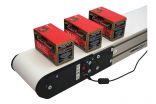MCLEAN, VA, November 12, 2010 (Press-News.org) Corcentric, a leading provider of accounts receivable automation and helping companies reduce the costs associated with processing business-to-business transactions, today announced a new check imaging service to help automate the reconciliation process to complement their accounts payable automation solution. Data is digitally captured from checks and remittance advice at a cost that is 50% less than what others charge for the same service.
By implementing Corcentric's check imaging solution, companies are able to convert from a paper-intensive process to a more efficient electronic method providing straight through processing with their accounting systems. This solution reduces operating costs and streamlines the distribution of information; giving companies a competitive advantage by improving cash flow and operational efficiencies that allow them to make deposits available in a shorter period of time.
Corcentric translates scans of the checks and remittance advice and extracts the data using new and improved proprietary technologies, which further validates and crosschecks data to ensure accuracy. The information is then formatted and made available to be imported into the client's accounting system as part of the accounts receivable automation process.
"For companies that are manually reconciling payments, our solution will drastically reduce overhead costs and dramatically speed up cash allocation. If they're currently using a bank or service to perform the remittance data capture, they are paying significantly more than they should. We are able to reduce their costs by 50% for the same service," stated Dave Lindeen, Vice President of Corcentric.
Corcentric is a leading provider of financial process automation solutions, specializing in accounts payable automation. By creating a paperless conduit between Procurement, Accounts Payable, Accounts Receivable, and suppliers, Corcentric allows companies to immediately manage 100% of their invoices electronically. Our cloud-based (SaaS) architecture allows for solutions to be configured in days rather than months for rapid return on investment.
Corcentric was founded in 1998 and is headquartered in McLean, Virginia with offices in Cherry Hill, NJ; Oakbrook Terrace, IL; Coral Springs, FL; and Saddlebrook, NJ. More than 3,000 companies rely on Corcentric solutions to automate their business commerce needs.
For more information on Corcentric, call 630.925.7677 or visit www.corcentric.com.
Corcentric Announces Straight Through Processing with Their New Accounts Receivable Automation Solution
Service captures data from checks and remittance advice at a significantly lower cost.
2010-11-12
ELSE PRESS RELEASES FROM THIS DATE:
Dorner's New iDrive Conveyor Adds Speed, Capacity for Tight-Space Packaging and Industrial Applications
2010-11-12
Faster speeds, increased weight capacity and indexing capabilities are the characteristics driving Dorner's new 3200 Series iDrive belt conveyor.
The iDrive Series, which debuted last year on Dorner's 2200 Series conveyors, represents the latest in conveyor innovation: integrating the motor, gearbox and motor controller all within the frame of the conveyor. This sleek, space-saving design allows the conveyor to fit into the tightest of spaces without worry.
Seen as the big brother to the 2200 Series iDrive, the 3200 Series iDrive conveyor is designed for more heavy-duty ...
New class of 'dancing' dendritic cells derived from blood monocytes
2010-11-11
Dendritic cells, known to be the prime movers of the body's immune response, are still notoriously difficult to study in humans. Samples, which come primarily from bone marrow or lymphoid tissue, are simply too difficult to obtain. But new research at Rockefeller University has shown scientists a way to study "authentic" dendritic cells from mouse monocytes, which are abundant in the blood, a much more accessible source in humans. The discovery, published Oct. 29 in Cell, promises to accelerate research into therapeutic uses of dendritic cells in people, particularly in ...
Depression linked to altered activity of circadian rhythm gene
2010-11-11
COLUMBUS, Ohio – Depression appears to be associated with a molecular-level disturbance in the body's 24-hour clock, new research suggests.
Scientists examined genes that regulate circadian rhythm in people with and without a history of depression. As a group, those with a history of depression had a higher level of activity of the so-called Clock gene, which has a role in regulating circadian rhythm, than did people with no mood disorders.
Higher expression levels of this gene suggest something is amiss in the body's 24-hour biological and behavioral cycle, which ...
UCLA researchers identify molecular program for brain repair following stroke
2010-11-11
A stroke wreaks havoc in the brain, destroying its cells and the connections between them. Depending on its severity and location, a stroke can impact someone's life forever, affecting motor activity, speech, memories, and more.
The brain makes an attempt to rally by itself, sprouting a few new connections, called axons, that reconnect some areas of the brain. But the process is weak, and the older the brain, the poorer the repair. Still, understanding the cascade of molecular events that drive even this weak attempt could lead to developing drugs to boost and accelerate ...
New time line for appearances of skeletal animals in fossil record developed by UCSB researchers
2010-11-11
(Santa Barbara, Calif.) –– Beginning around 542 million years ago, a profusion of animals with shells and skeletons began to appear in the fossil record. So many life forms appeared during this time that it is often referred to as the "Cambrian Explosion."
Geologists at UC Santa Barbara and a team of co-authors have proposed a rethinking of the timeline of these early animal appearances. Their findings are published in the latest issue of the Geological Society of America Bulletin.
Charles Darwin, in his book "On the Origin of Species," was troubled by the way the fossil ...
Novel metamaterial vastly improves quality of ultrasound imaging
2010-11-11
University of California, Berkeley, scientists have found a way to overcome one of the main limitations of ultrasound imaging – the poor resolution of the picture.
Everyone who has had an ultrasound, including most pregnant women, is familiar with the impressionistic nature of the images. One of the limits to the detail obtainable with sonography is the frequency of the sound: The basic laws of physics dictate that the smallest objects you can "see" are about the size of the wavelength of the sound waves. For ultrasound of deep tissues in the body, for example, the sound ...
Study finds low birth weight may cause lifelong problems processing medications
2010-11-11
CORVALLIS, Ore. – New research has found that a mother's poor nutrition during pregnancy and nursing can cause problems for her offspring's ability to process medications, even well into adulthood.
The results of the study, by Oregon State University researchers, suggest that in the future physicians prescribing drugs ranging from Tylenol to cancer chemotherapies may need to factor birth weight along with body weight into dosing decisions for their patients.
In this laboratory study, the kidneys of underweight animals born to mothers fed low-protein diets during pregnancy ...
A love game: Fish courtship more complex than thought
2010-11-11
Monash University researchers have discovered that male Australian desert goby fish are surprisingly strategic when it comes to courtship, adapting their tactics depending on the frequency of their contact with females.
Attracting females involves significant time, energy and exposure to predation and previous research has indicated that male gobies are more likely to court larger females due to the number of eggs they carry compared with their smaller counterparts.
However, new research, published in the journal Behavioral Ecology and Sociobiology, indicates that ...
Mid-life cholesterol levels not linked to Alzheimer's disease
2010-11-11
ST. PAUL, Minn. – Contrary to earlier research, a new, long-term study suggests that cholesterol level in mid-life may not be linked to later development of Alzheimer's disease, according to a study published in the November 10, 2010, online issue of Neurology®, the medical journal of the American Academy of Neurology. However, the results suggest that large decreases in cholesterol levels in old age could be a better predictor of developing the memory-robbing disease.
"While some studies suggest that cholesterol is a risk factor for dementia, others have not replicated ...
High cholesterol in middle age women not a risk factor for Alzheimer's and other dementias
2010-11-11
High cholesterol levels in middle age do not appear to increase women's risk of developing Alzheimer's disease and other forms of dementia later in life, new Johns Hopkins-led research finds, despite a body of scientific evidence long suggesting a link between the two.
What the study, published online in the journal Neurology, does find is that women whose cholesterol levels decline from middle age to old age are at 2.5 times greater risk of developing the memory-wasting diseases than those whose cholesterol stayed the same or increased over the years.
"Our research ...
LAST 30 PRESS RELEASES:
ASU researchers to lead AAAS panel on water insecurity in the United States
ASU professor Anne Stone to present at AAAS Conference in Phoenix on ancient origins of modern disease
Proposals for exploring viruses and skin as the next experimental quantum frontiers share US$30,000 science award
ASU researchers showcase scalable tech solutions for older adults living alone with cognitive decline at AAAS 2026
Scientists identify smooth regional trends in fruit fly survival strategies
Antipathy toward snakes? Your parents likely talked you into that at an early age
Sylvester Cancer Tip Sheet for Feb. 2026
Online exposure to medical misinformation concentrated among older adults
Telehealth improves access to genetic services for adult survivors of childhood cancers
Outdated mortality benchmarks risk missing early signs of famine and delay recognizing mass starvation
Newly discovered bacterium converts carbon dioxide into chemicals using electricity
Flipping and reversing mini-proteins could improve disease treatment
Scientists reveal major hidden source of atmospheric nitrogen pollution in fragile lake basin
Biochar emerges as a powerful tool for soil carbon neutrality and climate mitigation
Tiny cell messengers show big promise for safer protein and gene delivery
AMS releases statement regarding the decision to rescind EPA’s 2009 Endangerment Finding
Parents’ alcohol and drug use influences their children’s consumption, research shows
Modular assembly of chiral nitrogen-bridged rings achieved by palladium-catalyzed diastereoselective and enantioselective cascade cyclization reactions
Promoting civic engagement
AMS Science Preview: Hurricane slowdown, school snow days
Deforestation in the Amazon raises the surface temperature by 3 °C during the dry season
Model more accurately maps the impact of frost on corn crops
How did humans develop sharp vision? Lab-grown retinas show likely answer
Sour grapes? Taste, experience of sour foods depends on individual consumer
At AAAS, professor Krystal Tsosie argues the future of science must be Indigenous-led
From the lab to the living room: Decoding Parkinson’s patients movements in the real world
Research advances in porous materials, as highlighted in the 2025 Nobel Prize in Chemistry
Sally C. Morton, executive vice president of ASU Knowledge Enterprise, presents a bold and practical framework for moving research from discovery to real-world impact
Biochemical parameters in patients with diabetic nephropathy versus individuals with diabetes alone, non-diabetic nephropathy, and healthy controls
Muscular strength and mortality in women ages 63 to 99
[Press-News.org] Corcentric Announces Straight Through Processing with Their New Accounts Receivable Automation SolutionService captures data from checks and remittance advice at a significantly lower cost.



